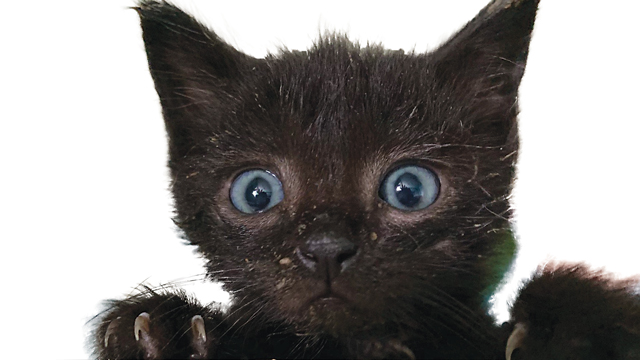Todd the kitten weighed less than a pound when he came to Richmond Animal League from a local animal control partner. More ominous than that, he came with medical records that read: Suspect ringworm, recommend euthanasia.
Ringworm is a fungal infection of the skin – the same fungus that causes athlete’s foot. The spores spread easily through direct or indirect contact, but animals with weakened immune systems are extremely susceptible to developing the infection. Ringworm is a shelter headache. Once it’s in, it can spread very quickly to immunocompromised animals such as kittens, puppies, or even older, stressed animals. It is not fatal, but many animal control partners do not have adequate resources to handle or treat it – especially if it spreads to a large population of animals.
Diagnosis of ringworm is typically made by either shining a special black light called a Wood’s lamp on affected areas or using a toothbrush to collect samples for fungal cultures. Treatment is relatively easy but requires a time commitment. The animal receives an oral anti-fungal medication and is treated topically with a lime-sulfur bath twice weekly. It smells like rotten eggs, but it is well worth the stink to save a life.
Todd the kitten (shown above) came to RAL needing to be isolated while his ringworm was treated, but he was too tiny to stay at the shelter. Todd needed special care, so a foster volunteer was contacted.
Fosters volunteer with RAL in a variety of capacities. Some foster families house handfuls of kittens until they are spayed or neutered and ready to be adopted, others take home a dog that needs a break from the kennels, and there are the ones who help take on more challenging animals, like a kitten with ringworm. The foster volunteer brings the animal(s) into their home and cares for it as if it were their own. Sometimes animals stay with fosters for a short amount of time, and other times, they stay a while. Some even become foster fails, although we like to refer to them as foster adoption successes because the foster pet found a forever home.
The foster volunteer picked up Todd quickly, brought him home, and administered the oral medicine and twice-weekly baths for nearly two months. Gradually, Todd’s foster got rid of his ringworm, and he was ready to be adopted. His bright blue eyes were irresistible, and he found his home right away.
Stories like Todd’s happen every day at RAL. Sometimes, animals come in and go to a new home immediately, and sometimes, they need more care, more treatment, and more patience.
The holiday season is a special time of year when many families are considering adding a pet to their home. There is never a bad time to adopt a pet, and there are always cats and dogs waiting at shelters around the region for humans who want to expand their families.
During Operation Silent Night at RAL, which runs December 9 through December 21, all adoption fees will be $10 in an attempt to clear the shelter. Any animals not adopted during that time go into foster homes for the holiday; so late December would be a prime opportunity to try opening your home to a foster for a short period.
Make room in your house for an animal this holiday season, whether it is forever or just a welcome break from the shelter. And while the dog or cat might seem like the needy one, often the family who finds the pet receives the greatest gift. For more information on Operation Silent Night or fostering, please visit RAL.org.




